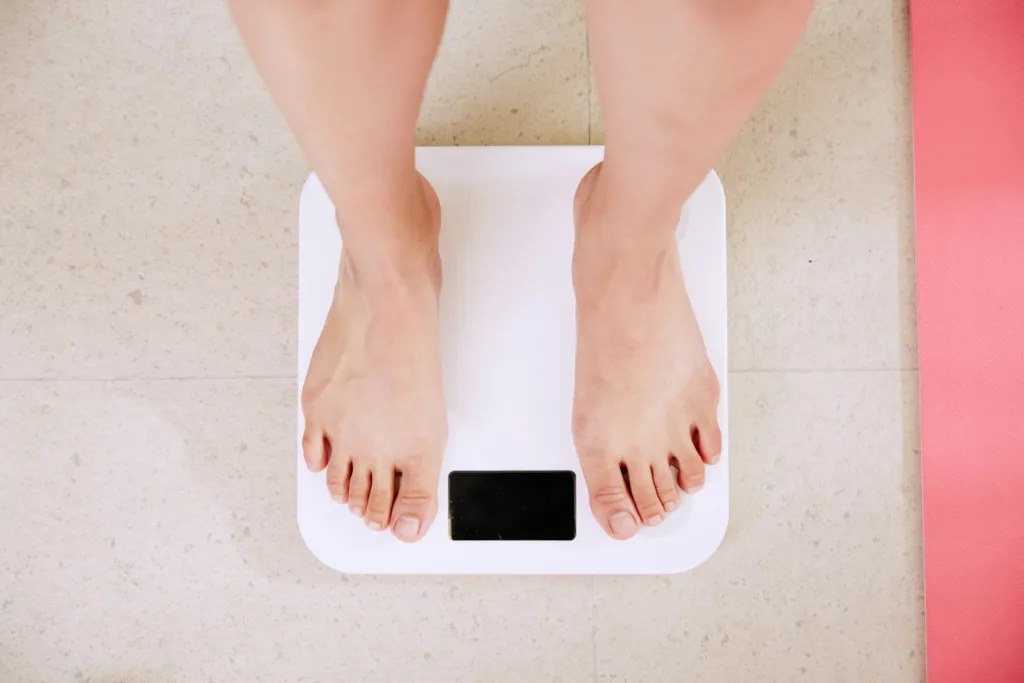Get Motivated! A 6 Week Diet Plan to Lose 20 Pounds

Table of Contents
Losing 20 pounds in 6 weeks may seem like a daunting task, but with the right approach and mindset, it is achievable. It's important to approach weight loss sustainably and healthily to ensure long-term success. In this article, we will explore the best strategies and techniques to help you reach your weight loss goals safely and effectively with this 6 week diet plan to lose 20 pounds.
Setting Realistic Expectations: Gradual and Sustainable Weight Loss
Before diving into the specifics of how to lose 20 pounds in 6 weeks, it's important to set realistic expectations. Sustainable weight loss typically involves losing 1-2 pounds per week. This gradual approach not only ensures that you are losing weight in a healthy manner but also increases the likelihood of maintaining your weight loss in the long run. Rapid weight loss can lead to muscle loss and other negative side effects, making it more challenging to sustain your progress.
The Role of Calorie Intake and Physical Activity in Weight Loss
When it comes to weight loss, the basic principle is to create a calorie deficit by burning more calories than you consume. This can be achieved through a combination of reducing your calorie intake and increasing your physical activity level. Let's take a closer look at these two key components of a successful weight loss journey.
Calorie Intake: Creating a Balanced and Nutrient-Dense Diet Plan
One of the best ways to lose weight is to pay attention to your calorie intake. This involves not only reducing the number of calories you consume but also ensuring that you are getting the necessary nutrients to support your overall health and well-being.
Here are some tips for creating a balanced and nutrient-dense diet plan:
- Track Your Calories: Start by tracking your daily calorie intake using a food diary or a calorie-tracking app. This will give you a better understanding of your current eating habits and help you identify areas where you can make adjustments.
- Create a Calorie Deficit: To lose weight, you need to create a calorie deficit by consuming fewer calories than you burn. Aim for a deficit of 500-1000 calories per day, which can result in a weight loss of 1-2 pounds per week[^1^].
- Focus on Healthy Foods: Instead of relying on processed and junk foods, prioritize whole, unprocessed foods that are rich in nutrients. Include plenty of fruits, vegetables, lean proteins, whole grains, and healthy fats in your diet. Cut all junk food from your diet. Remember junk in = junky body!
- Increase Your Protein Intake: Protein is an essential nutrient for weight loss as it helps to increase satiety, preserve muscle mass, and support a healthy metabolism[^3^]. Include lean sources of protein such as chicken, fish, tofu, and legumes in your meals.
- Incorporate Healthy Fats: Contrary to popular belief, fats are an important part of a healthy diet. Opt for sources of healthy fats such as avocados, nuts, seeds, and olive oil. These fats can help you feel satisfied and provide essential nutrients for your body.
- Watch Portion Sizes: Be mindful of portion sizes to avoid overeating. Use measuring cups, food scales, or visual cues to ensure you are eating appropriate portion sizes.
- Stay Hydrated: Drinking enough water is essential for overall health and can also support weight loss. Aim to drink at least 8 cups (64 ounces) of water per day and avoid sugary beverages.
Physical Activity: Incorporating Exercise into Your Daily Routine
In addition to managing your calorie intake, incorporating regular physical activity into your daily routine is crucial for achieving your weight loss goals. Exercise not only helps to burn calories but also improves cardiovascular health, builds muscle mass, and boosts your metabolism.
Here are some tips for incorporating exercise into your weight loss plan:
- Choose Activities You Enjoy: Find physical activities that you enjoy and are more likely to stick with. This could be anything from brisk walking, jogging, swimming, cycling, or dancing. The key is to find activities that you look forward to and that fit into your lifestyle. Choosing activities that you naturally enjoy are an effective way to get exercise into your daily routine without trying.
- Aim for a Balanced Routine: Include a combination of cardiovascular exercise and strength training in your routine. Cardiovascular exercises such as running, biking, or swimming can help burn calories and improve heart health. Strength training exercises, on the other hand, help build muscle mass and increase your metabolism. A healthy lifestyle is built upon incorporating both types of exercise and getting enough sleep. Lack of sleep (less than 8 hours per night) has been scientifically proven to add pounds to your waist.
- Gradually Increase Intensity: If you're new to exercise, start with low-impact activities and gradually increase the intensity over time. This will help prevent injuries and allow your body to adapt to the new demands.
- Make it a Habit: Consistency is key when it comes to exercise. Aim for at least 150 minutes of moderate-intensity aerobic activity or 75 minutes of vigorous-intensity activity per week, along with muscle-strengthening activities on two or more days. Find a schedule that works for you and make exercise a regular part of your routine. Healthy habits are built with consistency so don't give up even if you miss a workout or eat that piece of cake.
- Stay Active Throughout the Day: In addition to dedicated exercise sessions, look for ways to stay active throughout the day. Take the stairs instead of the elevator, go for short walks during your breaks, or incorporate active hobbies into your routine.
Lifestyle Changes for Sustainable Weight Loss
In addition to managing your calorie intake and incorporating physical activity, making certain lifestyle changes can also support your weight loss journey. Here are some key lifestyle factors to consider:
Prioritize Sleep and Mental Health
Adequate sleep and good mental health play important roles in weight management. Lack of sleep can disrupt your hunger hormones, leading to increased appetite and cravings[^6^]. Aim for 7-9 hours of quality sleep each night to support your weight loss efforts. Additionally, prioritize activities that promote mental well-being, such as stress management techniques, meditation, and engaging in activities you enjoy.
Practice Mindful Eating
Mindful eating involves paying attention to your eating experience and being present in the moment. This can help you recognize hunger and fullness cues, prevent overeating, and develop a healthier relationship with food. Slow down while eating, savor each bite, and listen to your body's signals of hunger and fullness.
Manage Stress Levels
Chronic stress can contribute to weight gain and make it more challenging to lose weight. Find healthy ways to manage stress, such as engaging in relaxation techniques, practicing yoga or meditation, and participating in activities that bring you joy and relaxation.
Stay Hydrated
Drinking enough water is essential for overall health and can also support weight loss. In addition to hydrating your body, water can help you feel fuller and prevent overeating. Aim to drink at least 8 cups (64 ounces) of water per day and carry a water bottle with you to stay hydrated throughout the day.
Consider Intermittent Fasting
Intermittent fasting is a popular eating pattern that involves alternating periods of fasting and eating. This approach can help reduce calorie intake, improve insulin sensitivity, and promote weight loss. There are different methods of intermittent fasting, so it's important to find an approach that works for you and aligns with your lifestyle and preferences.
Creating a Sustainable Meal Plan
A well-planned and balanced meal plan can support your weight loss efforts and make it easier to stick to your calorie goals. Here are some tips for creating a sustainable meal plan:
- Focus on Whole Foods: Build your meals around whole, unprocessed foods such as fruits, vegetables, lean proteins, whole grains, and healthy fats. These foods are nutrient-dense and can help keep you satisfied.
- Include Lean Protein: Protein is important for muscle repair and maintenance, as well as for keeping you feeling full. Include lean sources of protein such as chicken, turkey, fish, tofu, beans, and lentils in your meals.
- Incorporate Healthy Fats: Healthy fats, such as avocados, nuts, seeds, and olive oil, provide essential nutrients and help keep you satisfied. Include these fats in your meals in moderation.
- Choose Whole Grains: Opt for whole grains such as quinoa, brown rice, whole wheat bread, and oats. These grains are higher in fiber and provide more sustained energy compared to refined grains. A great way to incorporate whole grains in your diet is through whole grain sources. Stay away from bleached flour, processed foods, and white rice. Nutrient-dense foods are always best for your body.
- Practice Portion Control: Be mindful of portion sizes to avoid overeating. Use measuring cups, food scales, or visual cues to ensure you are eating appropriate portion sizes.
- Plan and Prep Ahead: Plan your meals for the week and prepare them in advance to save time and ensure that you have healthy options readily available. This can help you avoid relying on unhealthy convenience foods when you're short on time.
- Listen to Your Body: Pay attention to your body's hunger and fullness cues. Eat when you're hungry and stop when you're satisfied, rather than eating until you're overly full.
The Importance of Strength Training
Strength training is an essential component of a well-rounded weight loss plan. It not only helps build lean muscle mass but also increases your metabolic rate, allowing you to burn more calories throughout the day. Here's why strength training is important for weight loss:
- Muscle Mass and Metabolism: Muscle is more metabolically active than fat, meaning it burns more calories at rest. By increasing your muscle mass through strength training, you can boost your metabolism and increase calorie burn even when you're not actively exercising.
- Body Composition: Strength training helps improve body composition by reducing body fat and increasing lean muscle mass. This can lead to a more toned and defined physique.
- Bone Health: Strength training can help improve bone density and reduce the risk of osteoporosis, especially in women.
- Functional Strength: Building strength through resistance training can improve your overall physical performance and make daily activities easier and more enjoyable.
Incorporate strength training exercises into your routine at least two days per week. This can include weightlifting, bodyweight exercises, resistance band workouts, or other forms of resistance training. If you're new to strength training, consider working with a qualified fitness professional to ensure proper form and technique.
Staying Motivated and Overcoming Challenges
Losing 20 pounds in 6 weeks requires dedication, consistency, and motivation. Here are some tips to help you stay on track and overcome common challenges:
- Set Realistic Goals: Set achievable and realistic goals that align with your lifestyle and capabilities. Break your weight loss journey into smaller milestones and celebrate your progress along the way.
- Find an Accountability Buddy: Having someone to share your weight loss journey with can provide support, motivation, and accountability. Find a friend, or family member, or join a weight loss support group to stay connected and motivated.
- Track Your Progress: Keep a record of your weight loss progress, measurements, and non-scale victories. This can help you stay motivated and see how far you've come. An easy way to track your progress is through fitness apps.
- Celebrate Non-Scale Victories: Recognize and celebrate the non-scale victories along your weight loss journey. This could be fitting into a smaller clothing size, having more energy, or noticing improvements in your overall health and well-being.
- Don't Be Too Hard on Yourself: It's normal to have setbacks and occasional indulgences. Remember to be kind to yourself and focus on progress, not perfection. Learn from any setbacks and use them as an opportunity to grow and improve.
- Seek Professional Support: If you're struggling with weight loss or have specific health concerns, consider seeking support from a registered dietitian, nutritionist, life coach, or healthcare professional who can provide personalized guidance and support.
- Join our Midlife Happiness Hub, a vibrant Facebook group by Flourish After 40, where we celebrate the journey of rediscovery and joy in midlife. It's a place to connect, share, and find inspiration with like-minded women, all navigating the beautiful complexities of life after 40 together.
Embarking on a Sustainable Weight Loss Journey
Losing 20 pounds in 6 weeks is an achievable goal when approached with a sustainable and healthy mindset. By focusing on creating a calorie deficit, incorporating regular physical activity, making lifestyle changes, and following a balanced meal plan, you can make significant progress toward your weight loss goals.
Remember to stay patient, stay motivated, and celebrate your progress along the way. With dedication and consistency, you can achieve a healthier and happier version of yourself and shed those extra pounds.
In the end, however, remember that body image is more about how you feel than a number on the scale. A healthy body weight is important but don't be so focused on losing weight that you do unhealthy things. The long term approach is best and will keep health conditions like diabetes, heart disease, etc away.
Lasting change requires changing your habits and that takes time. So keep working hard and don't give up on yourself. I believe in you!

Disclosure: This website is reader-supported. Some of the links on this website are affiliate links, which means that we may earn a commission, at no additional cost to you, if you click on the link and make a purchase. Thank you for supporting our mission to help women.
🌟 Unlock Your Potential with Personalized Life Coaching

Ready to embark on a journey to a happier you? 🌼
👉 Are you looking to renew your sense of purpose in life?
👉 Seeking guidance for what you should do next in life?
👉 Eager to boost your energy levels to be an energic match for the universe?
👉 Want to manage stress and find your inner peace?
Look no further! My Life Coaching is your roadmap to a vibrant life. 🌈
🔥 WHY CHOOSE ME?
✅ Personalized Coaching: Tailored to YOUR unique goals and needs.
✅ Sustainable Results: Say goodbye to rehashing the past and start planning your future.
✅ Expert Guidance: I'm with you every step of the way.
✅ Transformative Mindset: Learn how to conquer obstacles and stay motivated.
✅ Proven Success: Join countless others who've achieved their dreams.
Don't wait any longer! Take the first step towards a healthier, happier life. 🌟
Let's chat about how we can kickstart your journey to the more fulfilling life that you wake up excited about every day.






